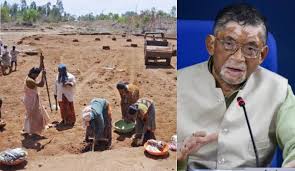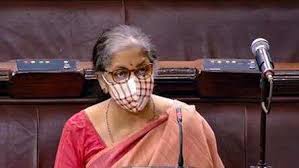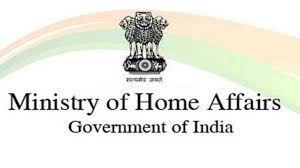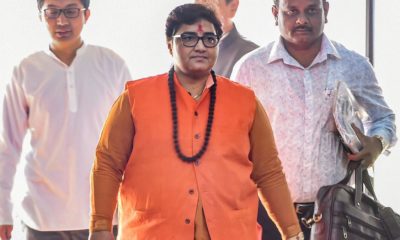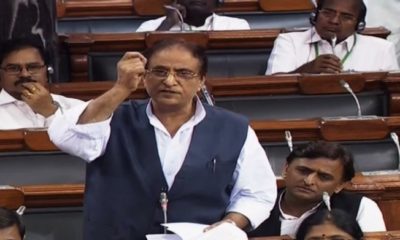Feature
Lok Sabha passes Bill to set up six new IITs
 New Delhi: The Lok Sabha on Monday passed the Institutes of Technology (Amendment) Bill, 2016, which seeks to set up six new Indian Institutes of Technology (IITs) including one at Jammu.
New Delhi: The Lok Sabha on Monday passed the Institutes of Technology (Amendment) Bill, 2016, which seeks to set up six new Indian Institutes of Technology (IITs) including one at Jammu.
The other new IITs are to come up in Tirupati, Palakkad, Goa, Dharwad, and Bhilai. Several members supported the bill but opposed the fee hike at the premier engineering institutes.
Union Human Resource Development Minister Prakash Javadekar, who had while moving the Bill, said that the government is focussing on improving the performance of the institutes and quality of education, in his reply to the debate, tried to assure the members on the fees, saying that the government is keen only to garner fees from who can pay.
“Education must be inclusive. To ensure equity it must be affordable also. But those capable of paying must pay. You should not oppose when rich are being asked to pay,” he said.
He said in three years, the government will mobilise Rs 20,000 crore for IITs.
Javadekar also sought to dispel the notion that the funding in IITs have declined, noting that the central government has allocated Rs 4,035 crore to the IITs this fiscal as against Rs 3,855 crore in previous year.
The government has formed High Education Financial Agency (HEFA) to upgrade the infrastructure, he said, adding that the Narendra Modi government is committed to “Sabko Shiksha Acchi Shiksa (Good Education to All).”
On the fee structure, something which was flagged by several members including Saugata Roy of Trinamool Congress, Javadekar said students from the ST and SC communities, from the Below Poverty Line (BPL) category and physically challenged have full waiver of fees in the IITs and NITs.
Families with income below Rs 9 lakh per annum also can get zero per cent education loan, he said adding affirmative steps can certainly change the scene of higher technical education in the country.
The debate was initiated by Congress member Gaurav Gogoi, who stressed on the need of quality of education and research.
The Bill also seeks to bring the Indian School of Mines, Dhanbad, within the ambit of the Act.
Javadekar also addressed the concern about coaching classes for entrance exam and said said the government has started online programme IIT-PAL, under which aspirants can get free tutorials, exams, and homework.
Among others, Arvind Sawant (Shiv Sena), and R.K. Jena (Biju Janata Dal) supported the bill.
Jayadev Galla (Telugu Desam Party) said government should set up a central university and a tribal university in Andhra Pradesh, while Communist Party of India-Marxist’s M.B. Rajesh suggested that higher technical education should be made more inclusive.
Satya Pal Singh (BJP) suggested that government should ask at least one IIT to focus on rural technologies with a view to promote inclusive development.
Entertainment
Meghalaya Reserves Legalized Gambling and Sports Betting for Tourists

The State Scores Extra High on Gaming-Friendly Industry Index
Meghalaya scored 92.85 out of 100 possible points in a Gaming Industry Index and proved to be India’s most gaming-friendly state following its recent profound legislation changes over the field allowing land-based and online gaming, including games of chance, under a licensing regime.
The index by the UK India Business Council (UKIBC) uses a scale of 0 to 100 to measure the level of legalisation on gambling and betting achieved by a state based on the scores over a set of seven different games – lottery, horse racing, betting on sports, poker, rummy, casino and fantasy sports
Starting from February last year, Meghalaya became the third state in India’s northeast to legalise gambling and betting after Sikkim and Nagaland. After consultations with the UKIBC, the state proceeded with the adoption of the Meghalaya Regulation of Gaming Act, 2021 and the nullification of the Meghalaya Prevention of Gambling Act, 1970. Subsequently in December, the Meghalaya Regulation of Gaming Rules, 2021 were notified and came into force.
All for the Tourists
The move to legalise and license various forms of offline and online betting and gambling in Meghalaya is aimed at boosting tourism and creating jobs, and altogether raising taxation revenues for the northeastern state. At the same time, the opportunities to bet and gamble legally will be reserved only for tourists and visitors.
“We came out with a Gaming Act and subsequently framed the Regulation of Gaming Rules, 2021. The government will accordingly issue licenses to operate games of skill and chance, both online and offline,” said James P. K. Sangma, Meghalaya State Law and Taxation Minister speaking in the capital city of Shillong. “But the legalized gambling and gaming will only be for tourists and not residents of Meghalaya,” he continued.
To be allowed to play, tourists and people visiting the state for work or business purposes will have to prove their non-resident status by presenting appropriate documents, in a process similar to a bank KYC (Know Your Customer) procedure.
Meghalaya Reaches Out to a Vast Market
With 140 millions of people in India estimated to bet regularly on sports, and a total of 370 million desi bettors around prominent sporting events, as per data from one of the latest reports by Esse N Videri, Meghalaya is set to reach out and take a piece of a vast market.
Estimates on the financial value of India’s sports betting market, combined across all types of offline channels and online sports and cricket predictions and betting platforms, speak about amounts between $130 and $150 billion (roughly between ₹9.7 and ₹11.5 lakh crore).
Andhra Pradesh, Telangana and Delhi are shown to deliver the highest number of bettors and Meghalaya can count on substantial tourists flow from their betting circles. The sports betting communities of Karnataka, Maharashtra, Uttar Pradesh and Haryana are also not to be underestimated.
Among the sports, cricket is most popular, registering 68 percent of the total bet count analyzed by Esse N Videri. Football takes second position with 11 percent of the bets, followed by betting on FIFA at 7 percent and on eCricket at 5 percent. The last position in the Top 5 of popular sports for betting in India is taken by tennis with 3 percent of the bet count.
Local Citizens will Still have Their Teer Betting
Meghalaya residents will still be permitted to participate in teer betting over arrow-shooting results. Teer is a traditional method of gambling, somewhat similar to a lottery draw, and held under the rules of the Meghalaya Regulation of the Game of Arrow Shooting and the Sale of Teer Tickets Act, 2018.
Teer includes bettors wagering on the number of arrows that reach the target which is placed about 50 meters away from a team of 20 archers positioned in a semicircle.
The archers shoot volleys of arrows at the target for ten minutes, and players place their bets choosing a number between 0 and 99 trying to guess the last two digits of the number of arrows that successfully pierce the target.
If, for example, the number of hits is 256, anyone who has bet on 56 wins an amount eight times bigger than their wager.




